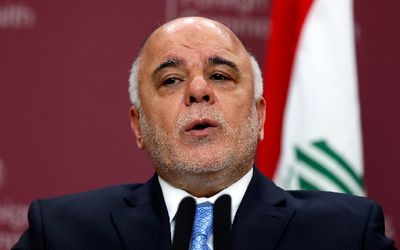Iraq’s parliament gives PM until Thursday on new cabinet amid unrest
by Saif Hameed and Stephen Kalin,
2016-03-28 17:38:39.0
BAGHDAD — Iraq’s parliament on Monday gave Prime Minister Haider al-Abadi three days to present a new non-party cabinet to fight corruption or potentially face a no-confidence vote amid street protests piling on the pressure for action.
A flash on state television called Thursday the "final deadline" for Mr Abadi, who said more than six weeks ago that he would replace ministers with technocrats unaffiliated with political parties.
Yet other politicians, including some within his own party, have pushed back against a reshuffle, fearing it could weaken the political patronage networks that have sustained their wealth and influence for more than a decade.
Powerful Shi’ite Muslim cleric Moqtada al-Sadr on Sunday launched a personal sit-in inside Baghdad’s heavily fortified Green Zone, which houses embassies and government offices.
His supporters extended a week-old sit-in just outside the district’s gates, huddling in tents and under umbrellas in heavy rain. They also demonstrated in the southern city of Basra.
Mr Sadr, who commands the loyalty of tens of thousands of supporters, including Shi’ite fighters who helped defend Baghdad against Sunni Islamic State militants in 2014, has re-emerged as a leader in matters of state in recent months.
"If Abadi does not present his new government by Thursday, then he will be questioned in Saturday’s (parliamentary session)," said Sadr bloc MP Yasir al-Husseini. "This will be the start of a number of steps leading to a no-confidence vote." Failing to deliver on long-promised anti-corruption measures could weaken Mr Abadi’s government just as Iraqi forces are gearing up to try and recapture the northern city of Mosul from Islamic State.
Academics and bureaucrats
Support in parliament for withdrawing confidence from Mr Abadi did not appear unanimous on Monday.
Abbas al-Bayati, an MP from Mr Abadi’s ruling National Alliance coalition, said lawmakers would want an explanation for any further delay of reform steps but had not agreed to pursue a no confidence vote.
"Between now and Thursday is sufficient and if he cannot do it by then, he should come and clarify why in order to convince the blocs and the street," Mr Bayati told Reuters.
He said Mr Abadi had composed a preliminary roster of candidates for the new cabinet and coalition leaders were consulting with Sunni, Kurdish and other Shi’ite politicians "to create a balanced list that has the standards of professionalism and technocratic experience".
It was not clear which ministers were likely to be replaced but analysts doubted that substantive change was in the works.
An US-based Iraqi academic, Abbas Kadhim, tweeted last week that he had been short-listed for foreign minister, and a government source said senior ministry civil servants might be elevated to fill some positions.
Political analyst Fadhil Abu Ragheef said new technocrat ministers would likely come from Iraq’s existing parties and blocs. "They will not bring anything new," he said. "This is about changing the facade only; the core will remain the same."
Reuters

Iraqi Prime Minister Haider al-Abadi. File picture: REUTERS
BAGHDAD — Iraq’s parliament on Monday gave Prime Minister Haider al-Abadi three days to present a new non-party cabinet to fight corruption or potentially face a no-confidence vote amid street protests piling on the pressure for action.
A flash on state television called Thursday the "final deadline" for Mr Abadi, who said more than six weeks ago that he would replace ministers with technocrats unaffiliated with political parties.
Yet other politicians, including some within his own party, have pushed back against a reshuffle, fearing it could weaken the political patronage networks that have sustained their wealth and influence for more than a decade.
Powerful Shi’ite Muslim cleric Moqtada al-Sadr on Sunday launched a personal sit-in inside Baghdad’s heavily fortified Green Zone, which houses embassies and government offices.
His supporters extended a week-old sit-in just outside the district’s gates, huddling in tents and under umbrellas in heavy rain. They also demonstrated in the southern city of Basra.
Mr Sadr, who commands the loyalty of tens of thousands of supporters, including Shi’ite fighters who helped defend Baghdad against Sunni Islamic State militants in 2014, has re-emerged as a leader in matters of state in recent months.
"If Abadi does not present his new government by Thursday, then he will be questioned in Saturday’s (parliamentary session)," said Sadr bloc MP Yasir al-Husseini. "This will be the start of a number of steps leading to a no-confidence vote." Failing to deliver on long-promised anti-corruption measures could weaken Mr Abadi’s government just as Iraqi forces are gearing up to try and recapture the northern city of Mosul from Islamic State.
Academics and bureaucrats
Support in parliament for withdrawing confidence from Mr Abadi did not appear unanimous on Monday.
Abbas al-Bayati, an MP from Mr Abadi’s ruling National Alliance coalition, said lawmakers would want an explanation for any further delay of reform steps but had not agreed to pursue a no confidence vote.
"Between now and Thursday is sufficient and if he cannot do it by then, he should come and clarify why in order to convince the blocs and the street," Mr Bayati told Reuters.
He said Mr Abadi had composed a preliminary roster of candidates for the new cabinet and coalition leaders were consulting with Sunni, Kurdish and other Shi’ite politicians "to create a balanced list that has the standards of professionalism and technocratic experience".
It was not clear which ministers were likely to be replaced but analysts doubted that substantive change was in the works.
An US-based Iraqi academic, Abbas Kadhim, tweeted last week that he had been short-listed for foreign minister, and a government source said senior ministry civil servants might be elevated to fill some positions.
Political analyst Fadhil Abu Ragheef said new technocrat ministers would likely come from Iraq’s existing parties and blocs. "They will not bring anything new," he said. "This is about changing the facade only; the core will remain the same."
Reuters





















Change: 1.37%
Change: 1.32%
Change: 2.91%
Change: 0.45%
Change: 3.09%
Data supplied by Profile Data
Change: 1.59%
Change: 0.47%
Change: 1.37%
Change: 0.00%
Change: 0.44%
Data supplied by Profile Data
Change: 0.23%
Change: -0.03%
Change: 0.06%
Change: 0.30%
Change: 0.00%
Data supplied by Profile Data
Change: 0.25%
Change: 0.31%
Change: 0.13%
Change: 0.36%
Change: -0.66%
Data supplied by Profile Data